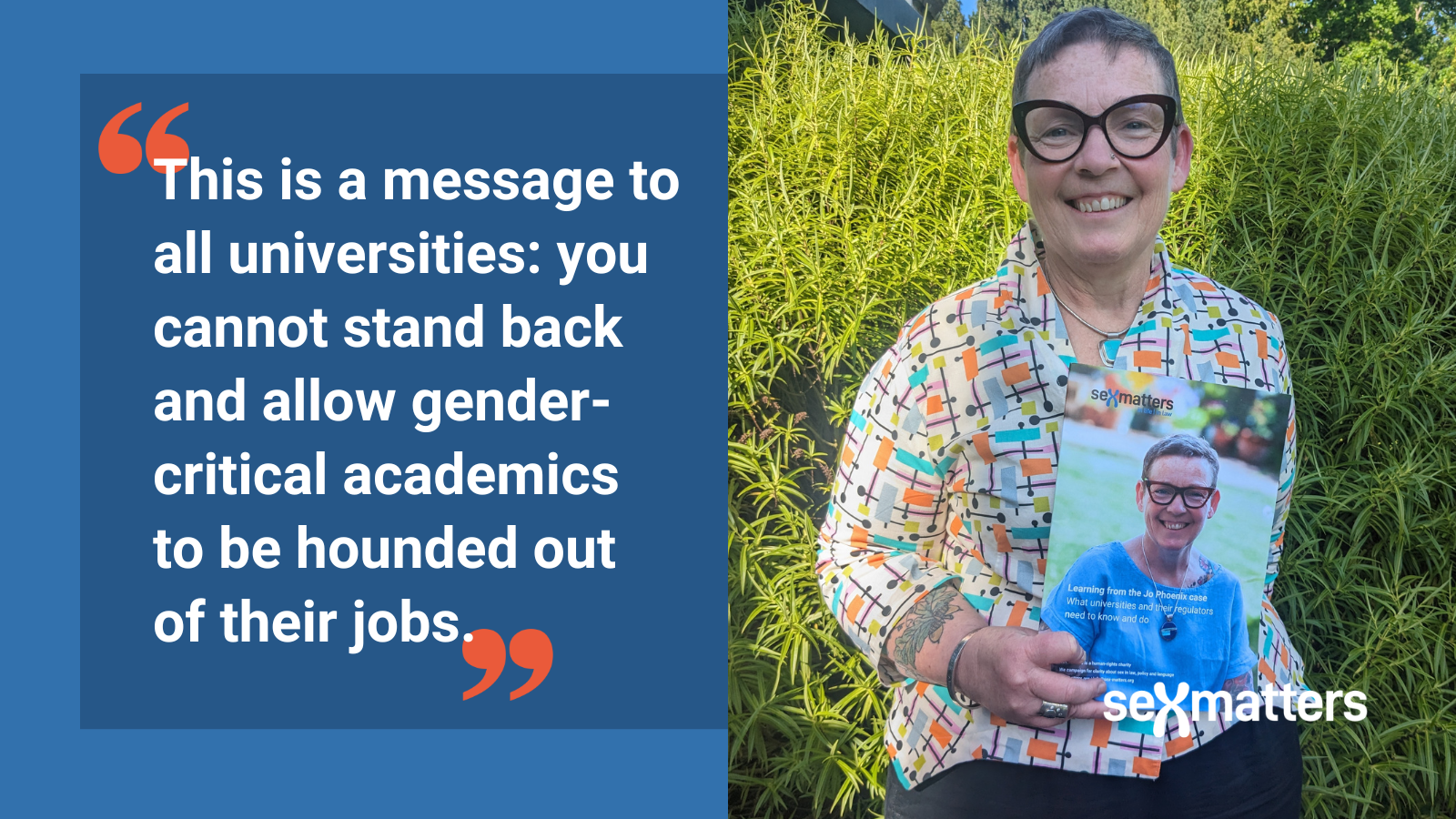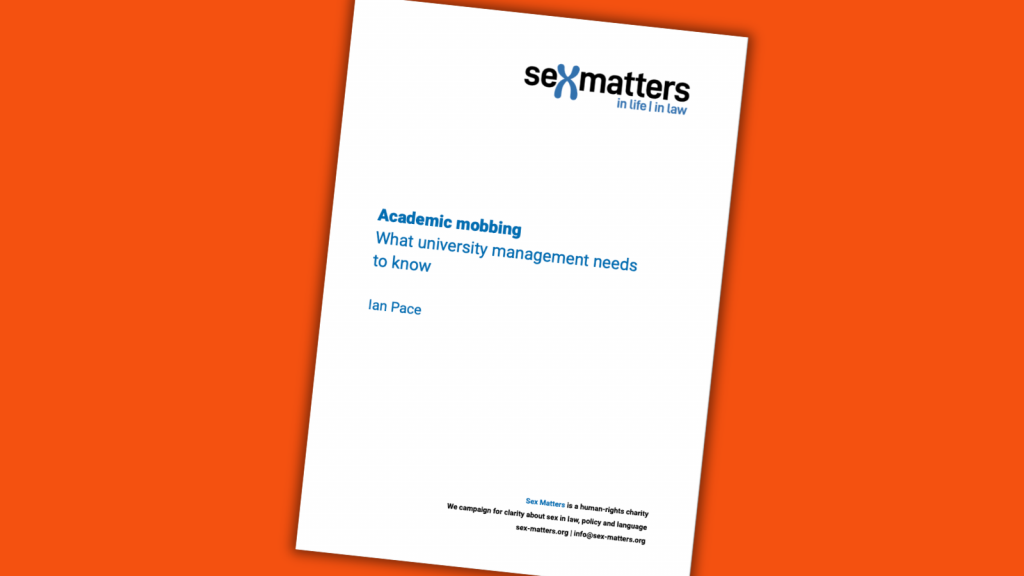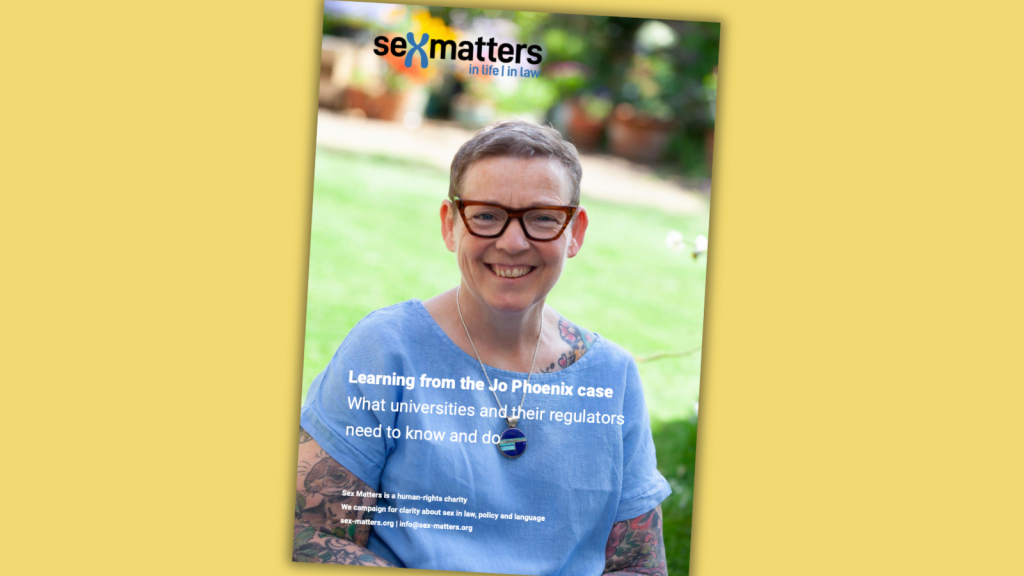The Jo Phoenix case should be a wake-up call for universities

In 2019 Professor Jo Phoenix became the target of a campaign of harassment from her colleagues at the Open University (OU) after she raised concerns about the silencing of gender-critical voices in academia. This ramped up in 2021 after she co-founded an academic research network for the rigorous exploration of issues of sex and gender. Hundreds of colleagues circulated an open letter calling for the OU to withdraw support from the network, with false allegations that she and her co-founders were hostile to trans people’s human rights.
The stress and the harm to her reputation of this academic mobbing left her in a state of trauma and unable to work.
In February 2024 an employment tribunal found the OU liable for more than 25 counts of belief discrimination and harassment, leading to unlawful constructive dismissal.
“We conclude that having 368 of your colleagues sign a public letter saying that you are part of a group that is fundamentally transphobic, is stigmatising and damaging and objectively was conduct that had the effect of creating an intimidating, hostile, degrading, humiliating or offensive environment for the Claimant.”
Employment Tribunal judgment
Today Sex Matters is publishing a report on learning from the Jo Phoenix case together with a paper by Professor Ian Pace on the phenomenon of workplace mobbing in universities. It was welcomed by Professor Robert Van de Noort CBE, vice-chancellor of Reading University, where Phoenix now works.
Professor Robert Van de Noort CBE, vice-chancellor of Reading University, welcoming our report with Professor Phoenix

Lessons to be learned
Jo Phoenix’s story exposes the prejudice towards gender-critical staff and students that is widespread in higher education. Her case should be a wake-up call for university senior management.
“The OU failed to protect me because of fear of being seen to support gender-critical beliefs. This is a message to all universities: you cannot stand back and allow gender-critical academics to be hounded out of their jobs.”
Professor Jo Phoenix
The legal lesson from the Phoenix case is simple: follow the Equality Act. Duty bearers under the act must recognise that people with gender-critical beliefs have equal rights and protections to those with other beliefs. Everyone is protected against discrimination and harassment related to all their protected characteristics.
The institutional lessons are harder. Many universities remain signed up to schemes such as Stonewall’s Workplace Equality Index that have encouraged them to misunderstand the law and ignore and downplay the rights of gender-critical people, viewing prejudice against them as righteous allyship.
Staff at the OU failed to challenge the discrimination and harassment against Jo Phoenix because they misunderstood the law and were afraid of being accused of transphobia. They had been trained to think this way and were advised by organisations that led them to think they were doing nothing wrong. So the OU’s senior managers carried on failing to protect Jo Phoenix and then spent an estimated million pounds defending their unlawful behaviour over a month-long employment tribunal hearing.
Following the judgment, the vice-chancellor of the OU promised to learn from his mistakes. Then, shockingly, he appointed a solicitor to provide independent legal advice who publicly denigrated gender-critical views and equated them with refusing to accept that trans people have rights.
Who needs to act?
Universities should stop defending their bad behaviour and instead take charge to fix the institutionalised problem.
The final lesson that should be taken away from the Jo Phoenix case is that while Phoenix succeeded in getting justice, her tormentors were able to stymie the culture of research and debate. Universities are valuable not because they are nice places for academics to work but because they build knowledge.
We will be sending our report to all university vice-chancellors and calling on them to take the lead in addressing this hostile environment and reclaiming their purpose:
- Make a strong commitment to intellectual diversity and institutional neutrality on controversial issues (the Kalven Principle).
- Consult with gender-critical staff and students to understand their experiences.
- Withdraw from benchmarking schemes promoted by lobby groups and review involvement in charter schemes such as Athena Swan.
- Review policies and make sure they are in line with the law; revise EDI training and create a culture of evidence-based discussion.
- Understand the phenomenon of mobbing and include it in training.
- Be brave and stand up to bullying.
The Office for Students should review whether involvement with the Stonewall Diversity Champions or Workplace Equality Index, Athena Swan Charter or GLADD Charter is compatible with academic freedom.
The Equality and Human Rights Commission has an important role to play. It should use its statutory powers to Invite universities to engage in a common “Section 23” agreement to address gender-critical discrimination and harassment, and to unwind discriminatory policies. It should also develop a set of model policies to help employers act in compliance with the Equality Act.
Research funding bodies should review whether incentives and policies linked to the Athena Swan and Stonewall conceps of gender identity undermine academic freedom and consider the quality of research they have funded that is informed by gender-identity ideology or about issues of sex and gender identity.
Read more…

Academic mobbing – what university management needs to know by Ian Pace, Professor of Music, Culture and Society at City, University of London

